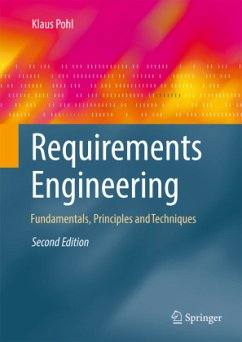This textbook provides a comprehensive and well-structured introduction to the fundamentals, principles, and techniques of requirements engineering (RE). It presents approved techniques for eliciting, negotiating, and documenting as well as validating, and managing requirements for software-intensive systems. The various aspects of the process and the techniques are illustrated using numerous examples based on extensive teaching experience and industrial collaborations.
The book is structured in five parts. Part I "Fundamentals and Framework" provides a comprehensive introduction to the fundamentals of RE, illustrates why it is a critical success factor for any software development project, and describes different ways of implementing it in an organization and its role in different software engineering process models. Part II "Requirements Engineering Context" explains the essential role and influence of the RE context on system requirements, defines basic terms,and introduces the concept of context perspectives to support context consideration. Part III "Core Activities" describes requirements elicitation, documentation, and negotiation and conflict resolution strategies. Part IV "Requirements Artefacts" explains the management of goals, scenarios, and solution-oriented requirements, including methodologies like i_ and KAOS. Eventually, Part V "Cross-Sectional Activities" details four validation and three management activities. This second edition of Pohl's widely used and trusted textbook provides a considerable number of updates, places a stronger focus on the consideration of the context, puts a stronger emphasis on conflict resolution, and includes new, expanded and revised techniques.
The presentation aims at professionals, students, and lecturers in systems and software engineering or business applications development. Professionals such as project managers, software architects, systems analysts, and software engineers will benefit in their daily work from the didactically well-presented combination of validated procedures and industrial experience. Students and lecturers will appreciate the comprehensive description of sound fundamentals, principles, and techniques, which is completed by a huge, commented list of references for further reading. Lecturers will find additional teaching material on the book's website, www.requirements-book.com.
The book is structured in five parts. Part I "Fundamentals and Framework" provides a comprehensive introduction to the fundamentals of RE, illustrates why it is a critical success factor for any software development project, and describes different ways of implementing it in an organization and its role in different software engineering process models. Part II "Requirements Engineering Context" explains the essential role and influence of the RE context on system requirements, defines basic terms,and introduces the concept of context perspectives to support context consideration. Part III "Core Activities" describes requirements elicitation, documentation, and negotiation and conflict resolution strategies. Part IV "Requirements Artefacts" explains the management of goals, scenarios, and solution-oriented requirements, including methodologies like i_ and KAOS. Eventually, Part V "Cross-Sectional Activities" details four validation and three management activities. This second edition of Pohl's widely used and trusted textbook provides a considerable number of updates, places a stronger focus on the consideration of the context, puts a stronger emphasis on conflict resolution, and includes new, expanded and revised techniques.
The presentation aims at professionals, students, and lecturers in systems and software engineering or business applications development. Professionals such as project managers, software architects, systems analysts, and software engineers will benefit in their daily work from the didactically well-presented combination of validated procedures and industrial experience. Students and lecturers will appreciate the comprehensive description of sound fundamentals, principles, and techniques, which is completed by a huge, commented list of references for further reading. Lecturers will find additional teaching material on the book's website, www.requirements-book.com.
From the reviews:
"[...] Pohl succeeds in providing "a comprehensive, well-structured, and easy-to-read ... compendium" on the field of requirements engineering where such did not exist previously. It serves as an excellent reference volume [...]. The layout, visuals, and organization of the book are exceptional. [...] Students, practitioners, and researchers with an interest in requirements engineering for software and systems engineering should consider adding this unique book to their library." ACM Computing Reviews, Michael G. Murphy, Southern Polytechnic State University, Marietta, GA, USA, January 2011
"800-page volume divided into eight parts and 38 chapters. Pohl went to great lengths in organizing the book, and has been successful in providing a clean, comprehensive, and well-structured work. ... Each part provides collections of basic and advanced reading lists for the individual chapters. The book concludes with a very helpful glossary of terms, a comprehensive collection of references, and a well-organized index. Summing Up: Highly recommended. Upper-division undergraduate through professional collections." J. Beidler, Choice, Vol. 48 (6), February 2011
"[...] Pohl succeeds in providing "a comprehensive, well-structured, and easy-to-read ... compendium" on the field of requirements engineering where such did not exist previously. It serves as an excellent reference volume [...]. The layout, visuals, and organization of the book are exceptional. [...] Students, practitioners, and researchers with an interest in requirements engineering for software and systems engineering should consider adding this unique book to their library." ACM Computing Reviews, Michael G. Murphy, Southern Polytechnic State University, Marietta, GA, USA, January 2011
"800-page volume divided into eight parts and 38 chapters. Pohl went to great lengths in organizing the book, and has been successful in providing a clean, comprehensive, and well-structured work. ... Each part provides collections of basic and advanced reading lists for the individual chapters. The book concludes with a very helpful glossary of terms, a comprehensive collection of references, and a well-organized index. Summing Up: Highly recommended. Upper-division undergraduate through professional collections." J. Beidler, Choice, Vol. 48 (6), February 2011


